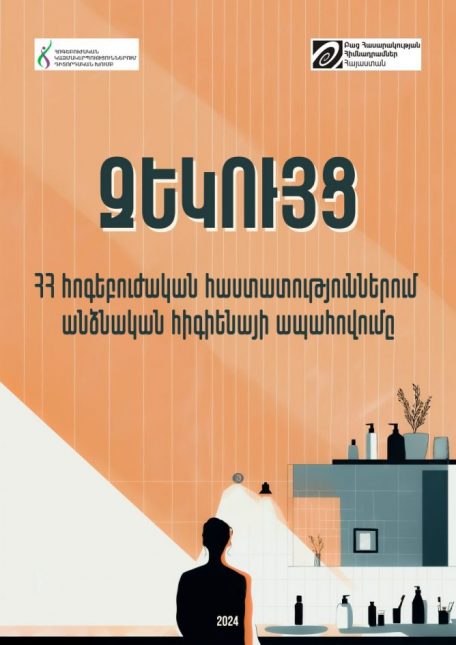Within the framework of this report, the Monitoring Group in Psychiatric Institutions studied the components of ensuring personal hygiene of persons receiving treatment and care in 7 psychiatric institutions of Armenia: organization of bathing, hand hygiene, ensuring dental, hair, and nail care, shortcomings in ensuring personal hygiene and obstacles to its provision.
The problems recorded in relation to ensuring hygiene conditions for persons receiving treatment and care in institutions are:
Insufficient provision and/or general absence of personal space and conditions for storing personal belongings
The minimum standards for having the necessary personal space are not provided in institutions. Therefore, persons receiving treatment and care are deprived, among other things, of the opportunity to keep their personal belongings, including hygiene and care items, separately. The Monitoring Group recorded a discrepancy between the number of side cabinets and the number of beds, a dense arrangement of beds in rooms, which makes entry and exit difficult, and there are no cabinets for storing clothes at all.
Inadequate sanitary and hygienic conditions of the areas necessary for ensuring personal hygiene
Insufficient number of plumbing fixtures (shower, toilet, sink) and furniture (chair, non-slip mats) necessary for safe bathing
Inadequate quality and procedure for providing accessories (shampoo, shaving foam, pads, etc.), insufficient quantity or complete absence
As a rule, 1-3 toilets are installed in the departments, and the number of people receiving treatment and care on the days of observation was 7-65 people. In psychiatric institutions, the number of people using one toilet reached up to 43. The problem is even more complicated when the toilet is clogged. For example, on the day of the visit to the Gyumri Mental Health Center, all three toilets intended for men were clogged and the patients were using the toilet intended for employees.
The issue of cleanliness of toilets, as well as ensuring the privacy of persons receiving treatment and care when using the toilet, was also recorded. In particular, toilets are separated only on three sides (National Center for Mental Health Protection and “Avan” Mental Health Center) or are not separated at all (Sevan Mental Health Center). In other words, a separate area for taking care of personal needs is not provided.
Moreover, as a rule, washbasins are located in the same area as toilets. In other words, three people can use a toilet without a door and at the same time 3 other people can use the washbasin, which cannot be considered acceptable from the point of view of personal dignity.
In the departments of psychiatric institutions, one bathroom with one shower is mainly available. In those institutions where there are 2-3 showers in one bathroom, they are separated by partitions, with the exception of the Sevan Mental Health Center. In the bathrooms, with the exception of the Lori Regional Neuropsychological Dispensary, an arbitrary chair serves as a chair, which does not correspond to the description of a bathroom chair and, as a rule, is worn out.
In the Syunik Regional Neuropsychological Dispensary, a shower lasts 5-10 minutes. In the Armash Health Center named after Academician A. Hayriyan, three patients use one shower at the same time (for a total of 15 minutes). One of the beneficiaries notes:
While one is soaping, the other is getting wet, and the other is taking off. It is so fast and the water is sufficient.
The implementation of washing is not individualized, even underwear is not separated and individualized. At best, it is separated by departments. That is, the clothes of one person in the department (including underwear) can be received by another person after washing.
Academician A. In the Armash Health Center after Hayriyan, in the event of a water supply failure, people receiving treatment and care wash their hands with water collected in a broken, unclean container, which was half-empty on the day of the visit, and the water was murky. Moreover, even a small container was not available to take water.
Inaccessibility of water (especially hot)
For example, in the Lori Regional Psychoneurological Dispensary, hot water is usually poured into bottles and given to people receiving treatment and care. In the Gyumri Mental Health Center, it is necessary to turn on the water pump for hot water in the bathroom. In the National Center for Mental Health and the “Avan” Mental Health Center, constant hot water is available only during the winter months, during other months there is no hot water in the evenings, and in this case, too, people receiving treatment and care may take hot water in bottles for later use.
Insufficient human resources for proper hygiene compliance
Monitoring results show that the number of staff in psychiatric institutions is insufficient to ensure proper hygiene compliance by 40-65 people in the ward, to provide support to each person according to their needs, and to work with them individually,

